Introduction
This report is a conceptual framework based on research of the hotel sector in the UK. The paper uses Marriott Hotel to establish key areas that must be developed for improving the guest experience. Through the report, an audience can understand the metrics of the hospitality industry in the UK and refer to Marriott Hotel; it enlightens the reader on the variances. The data in this report was collected from secondary sources that are put in the public domain. The challenge in the research is getting the specific data for the hotel and giving analysis based on the collection of information. The report also is limited to the United Kingdom, and information available may be general for the entire sector.
The UK Hotel Sector
The hotel subsectors that the paper focuses on are accommodation, food and beverage services, events and conferences, and recreational services. The reason why the subsectors are included is because they play a key role in the development of hotels. The United Kingdom hotel sector comprises eating outlets, accommodation venues, conferencing centers, motels, lounges, and spas, among other categories. According to the British Beer and Pub Association (BBPA), the UK hotel industry has been a major tax contributing industry, with more than 75 million euros paid as tax in 2020 (Pappas, 2019). The hotels in the UK contribute to the tourist industry because of the hosting of domestic and international guests who visit the country for various reasons. The hotel sector has employed more than 2.9 million people, making up almost 10% of the UK workforce. Around 25% of the hotel workforce comes from the European Union (EU), whereby chefs take 25% while waiters 75% of the total figure (Pappas, 2019). The contingent of UK hotel employees is vast and has seen domestic and international staff work in various hotels.
Hotel Classification Systems in the UK
For the United Kingdom, a hotel is defined by accommodating all hotel services, including the interconnected departments and services, as mentioned in the above section. For a hotel to be fully capacitated, it must have food and beverage service, food production, housekeeping & laundry, front office, conference department, and recreational services such as swimming pool, sauna, gym, and others (Sufi and Singh, 2018). Hotels can be classified into various categories. The first category is country house hotel, which has ample grounds and gardens set in rural situations whereby the ambiance is calm characterized by quietness and peace. The other classification is a small hotel which means hotels with a maximum of 20 rooms for accommodation and are run by a single proprietor (Michaelides, 2017). The next category is townhouse hotel, which means a high-quality property situated in a town center with dinner and room service and possibly has more than 50 guest rooms. In the United Kingdom, hotels can be characterized by the nature of an establishment, which means accommodation and food and beverage service will be a key determinant.
Compared to Singapore, the UK hotel system seems well-established due to the factors mentioned above. In Singapore, hotels star-rated depend on the nature of the facility and the luxury of accommodation services in the guest rooms (Chyi and Hee, 2022). Just like the UK, Singapore determines the rating through the association of people and government agencies that work independently on this matter (Chyi and Hee, 2022). Thus, it is possible to find a 20-room hotel ranked 5-star (Chyi and Hee, 2022). All these perspectives show the nature of the European Union classification of the hotel by the necessities implicated.
Marriot Hotel UK
In the UK, Marriot hotels have been one of the hospitality institutions that offer all these sub-sectors in the hotel industry (Riasi, Schwartz, and Beldona, 2019). The hotel has food and beverage served in restaurants, bars, and cafes that are well established in the entire UK region. For example, accommodation at the Marriott can be seen at the hotel’s website, where a guest can check a raft of elements before making a reservation. The use of technology in hotels is also another subsector that the paper will establish.
Marriot Hotels management enables one to have a wide picture of what guests can find in the establishment. This contributes to the understanding of how the culture of the Europeans is when it comes to hospitality. For example, the firm offers information about spring break, fun in the summer, spring in the air, and homes that one can find near the hotels (Michaelides, 2017). Marriott hotel satisfies their customer in several ways. First, the firm ensures that guests are considered as the priority among all the stakeholders in the outlet. This is made possible by having collaborative energy between the hotel departments such as the front office, food production, food and beverage service, guest relations, and housekeeping (Vallen, 2013). Through the customized experience, Marriott Hotel curates a seamless personalization of data that enables customers to feel at home when they visit their hotel.
It is important to mention the Marriott Loyalty Program that has been put in place to connect customers and the hotel fraternity to make special requests about services, charges, facilities, and other elements. The chief commercial officer of the hotel, Mrs. Stephanie Linnartz, says that “Guests are willing to give us information about themselves, and they expect that we use it to enhance their experience. Whether it is a preference in pillow type or recommendations for local experiences once they’ve arrived at the destination, they expect us to leverage the information they’ve provided to personalize their experience and anticipate their needs” (Akbar and Tracogna, 2018). Through these aspects, the hotel sector in the UK can have a specific affiliation that can stand amongst other hospitality settings in the world.
Synthesis of UK Hotel Market
Key Brands
In the UK, there are key brands that have been popular in the country and in other parts of the world. Marriott Hotel is an example, as depicted in the first section, and the hotel is known for the exemplary provision of food and accommodation services using digital tech. The leading hotel brand chain in the UK as of 2020 is Premier Inn. The company is owned by Whitbread, a popular British group (Mun, Park, and Woo, 2022). The hotel has more than 75,000 rooms in the country. Other brands that follow the hotel include Travelodge, Holiday Inn, Hilton, Britannia, Best Western, Ibis, and DoubleTree.
Target Market
A target market, in this case, means a group of people who may share similar wants and needs for food and beverage services and accommodation. The main target market for the hotel industry in the UK comprises tourists, travelers, delegates attending seminars, workshops, and conferences (Toh, Raven, and DeKay, 2011). The other target market for the hotel industry in the UK includes people who want to explore luxuries such as the honeymoon, class, and status. Business travelers, for this matter, constitute the significant market for the industry (Mun, Park and Woo, 2022). In this case, the group of people who visit the UK for business reasons will seek hotel services as they undertake their duties in the country. For example, a person visiting the country to meet stakeholders for a newly formed company will request hotel services for convenience.
Families are also the key target market for UK hotels since they usually find time to spend holidays with their loved ones. This mostly happens when children have closed school and towards the major global holiday seasons such as Easter and Christmas, among others (Buckley et al., 2018). Couples who are newly married are part of the independent groups that seek hotel services. For example, during the honeymoons, people would want to have a private place where they can start their remarkable life, and therefore, they can stay at a given hotel for one or two months before they resume their normal life (Nicolau and Sharma, 2019). Other target markets include adventurers or people who want to get accommodated in hotels for reasons such as leisure and curiosity. It is also important to note that the UK government is also part of a key target market due to hosting conferences from many countries. There were many delegates, very important personnel (VIP) such as diplomats, ambassadors, officials in government, among others, who requested hospitality services.
Market Share
The market size in terms of revenue of the hotel industry in the UK can be given in various dimensions. As of 2022, UK hotels have taken more than 15 billion euros as market revenue (Padma and Ahn, 2020). The market is expected to increase by 144% in 2022 after declining by 6.6% in the last two years due to the effect of coronavirus (Wang, Li, Li, and Zhang, 2016). Globally, the hotel industry in the UK is ranked third in terms of the provision of food and beverage and accommodation for the guests. The hotel occupancy rate in the UK is 79.9%, and the estimated room supply is 840,000 (Padma and Ahn, 2020). As of 2021, the hotel occupancy in London was 83.5%. The gross value added (GVA) of hotels in the UK as of 2019 is $468 million (Padma and Ahn, 2020). Therefore, from the figures, it is true to say that the hotel industry in the UK is a phenomenal element in the economy.
Service Evaluation
Identification of Feedback from Social Media for Marriott Hotel, UK
Part of the development of a hotel is based on the perception customers have of a given brand. Having exemplary hotel services is one way of committing to value chain analysis that can help build returns on revenue (Weili, 2019). According to TripAdvisor.com, Marriot hotels have been in the run to satisfy their customers upon request. For example, as Figure 1 shows, the hotel received positive feedback from a client due to how staff coordinated the services. The comment has been directed to specific people at the front desk, service, and housekeeping for showing their concerns to the guest during the three night/4 day stay. According to the site, more than 3400 reviews are categorized in terms of excellent, very good, average, poor, and terrible (TripAdvisor, 2022). From Figure 2 below, the hotel seems to be offering excellent services, which have surpassed the negative reviews by a significant margin. A positive review builds a hotel and gives staff the esteem to work on their duties. For example, Jasparee, on 10.03.2022, wrote, “Started my day with great buffet breakfast at JW Marriot… Mr. Amit served the food with so much courteousness and love. Loved the food & the ambiance. The best part- the flute man playing soothing holy music” (TripAdvisor, 2022). That is an indicator that Marriott Hotel has perfectly done the duties professionally.
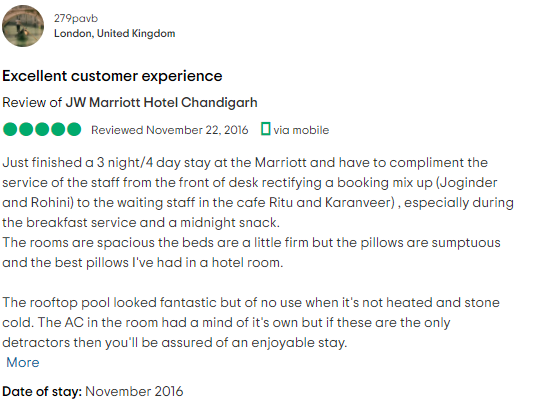
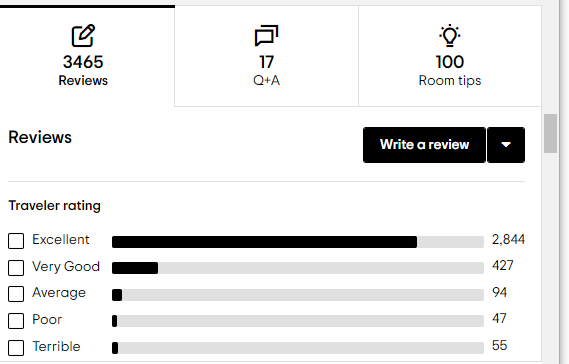
However, there are some of the customers who have different experiences with the Marriot Hotel. For example, a guest complained of the room and the staff’s conduct. As shown in Figure 3 below, the guest complained that the hotel employees were not bothered to change some of the faulty issues that the room had. Another client said, “Stayed here for half a day transiting between Mashobra and the airport. I was given a room where the heating did not work. I checked in on 2 January 2022, and the temperature outside was +8c. 80% of the lights in the room did not work, and the room looked like it was yet to be cleaned. The bed thankfully was clean and made” (TripAdvisor, 2022). It is normal for any hotel to have both negative and positive comments. All staff must ensure that guests are satisfied as they are an important part of the hotel.
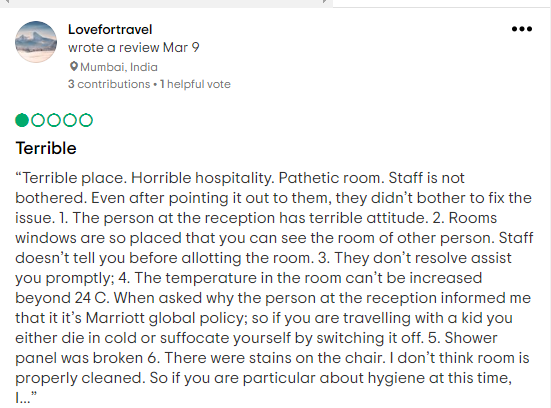
Analysis of Data Collected
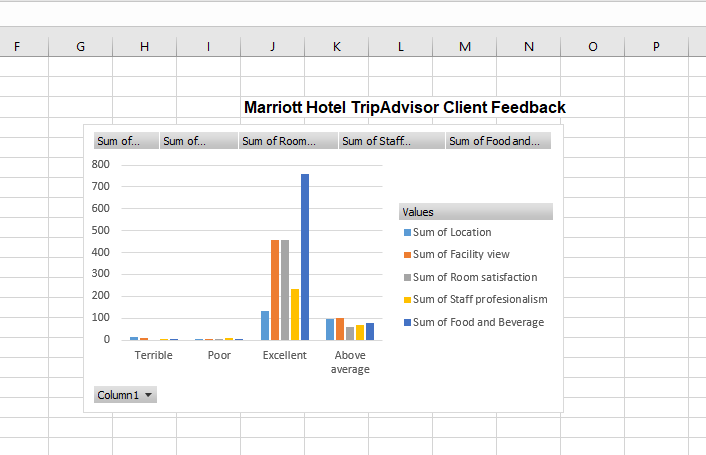
From the above figure, Marriott Hotel has excelled in the provision of food and beverage, facility view, and room satisfaction significantly since the comments are more than 400 for each element. The hotel has excelled in other aspects, although not notably as food and beverage, facility view, and room worth. Therefore, from the comments, there is a need to improve staff professionalism to meet the expectations of many customers. The terrible experience is evident in the location of the hotel and food and beverage services (Juddin, 2017). For the hotel to develop as per the demands of many customers, the management must check all the factors that drive the client towards visiting the facility. Some of the issues that may drag hotel business are the lack of strong internet connection and challenges in accessing hot water in the shower, among other issues (Lei, Wang and Law, 2019). Minding about a customer’s stay is important as it shows the value that a given hotel facility gives the client.
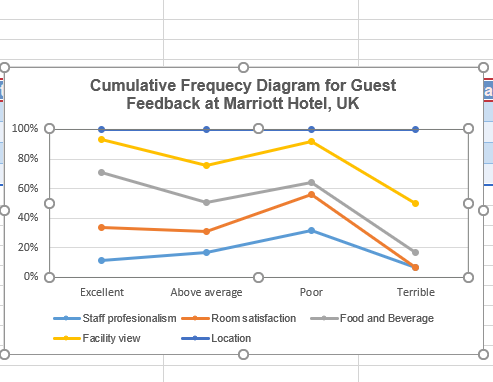
Suggestions of Practical Implications
Recommendations for Improving Guest Experience
Improving the Facility View
A satisfied guest has a chance of coming back once more to get the services if they were performed well. Therefore, the guest experience is notably important in developing the strong bond between a hotel facility and the customer (Buckley et al., 2018). Marriot Hotel UK needs to have a strategic plan that can accommodate all the stakeholders and give a perfect system of working together in the hospitality delivery of duties (Seidu, Opoku Mensah, Issau, and Amoah-Mensah, 2021). For example, since only a few guests have reviewed the hotel as one with professional staff, the hotel needs to have a comprehensive training program for all employees to handle customers.
There must be a familiarization of all the current trends in hospitality client requests such as the travel aspects, exploration centers, centers for checking the town, the direction of Islamic point during prayers, among others (Tavitiyaman, Tsui, Chan and Miu, 2021). Staff must be trained on how to handle the new factors that are associated with the hotel industry. In terms of location, most clients prefer the facilities to be set at the outskirts of busy avenues in the UK towns such as London, Birmingham, and others. This factor can only be considered during expansion since the current facilities may not be moved.
Food and Beverage Service Improvement
The report also recommends that the management of Marriott Hotel should consider changing the food and beverage services to fit specific groups. It means that the hotel should ensure that it has various restaurants that can cater to different groups in terms of culture, tastes, and preferences (Tavitiyaman, Tsui, Chan, and Miu, 2021). Concerning the rooms, the hotel must also update the structure and composition of the room. For example, the modern rooms must have an air conditioner, functional phone, a handset that can detect harmful objects, a digital card limiting the use of electricity when the guest is not in the room, and other issues. Additionally, the guest rooms must be sold with key cards and not physical keys (Seidu, Opoku Mensah, Issau, and Amoah-Mensah, 2021). The internet must be integrated that each room has a specific code that one person can only use. Another factor that must be considered in the room is a porch area that allows guests to have some more fresh air when relaxing in the room. All these recommendations are purposely to enable Marriott Hotel to be a top-notch provider of hospitality services.
Improving Professionalism
Technology is a key factor that can be useful in leveraging all these recommendations. Part of training must encompass handling data for the customers who visit a hotel. There was a concern over legal action due to the hackers who stole personal details for more than 300 guests (Shin and Jeong, 2020). A data breach is a critical issue that can be dealt with by having professional staff conduct. For example, while taking details for guests during registration, it is possible to expose the data to third parties while conducting the check-in process. Some of the elements associated with this issue are the laxity in professionalism (Shin and Jeong, 2020). Any aspect that must draw data from a guest should be taken with maximum keenness to ensure no data manipulation is evident. While attending to a guest, a hotel employee must always seek consent. For example, taking a guest’s passport to attach to the files is a critical factor contributing to data breaches. Details must remain private, and all systems used should be configured in that they cannot be accessed with authorization from the main server in case entries are attempted externally.
Conclusion
The hotel sector in the UK is one of the contributing sectors to the country’s economy. The industry is characterized by the production of revenue that helps in leveraging many social issues. Marriott Hotel in the UK is an example of an established hospitality facility growing tremendously. According to TripAdvisor, many clients have positively reviewed the guest experience. However, the hotel must improve various aspects such as the service offered, location, and professionalism with hotel client data.
Reference List
Akbar, Y. and Tracogna, A. (2018) ‘The sharing economy and the future of the hotel industry: Transaction cost theory and platform economics’, International Journal of Hospitality Management, 71(8), pp.91-101.
Buckley et al. (2018) ‘Clusters of Legionnaires’ disease in period hotels with complex water systems: lessons learned in the West Midlands, UK’, The Lancet, 392(5), p. S22.
Chyi, C. and Hee, O. (2022) ‘Linking service quality, guest satisfaction and length of stay to e-WOM: a study in the hotel industry of Singapore’, Middle East J. of Management, 9(1), p.44.
Jones, P. and Comfort, D. (2021) ‘Modern slavery statements and leading UK hotel companies’, Athens Journal of Tourism, 8(3), pp.147-162. (Jones and Comfort, 2021).
Juddin, M. (2017) ‘The jargon used by employees of food and beverage service (FBS division) at hotels’, Linguistics, Literature and English Teaching Journal, 7(1), p.93.
Lei, S., Wang, D. and Law, R. (2019) ‘Perceived technology affordance and value of hotel mobile apps: a comparison of hoteliers and customers’, Journal of Hospitality and Tourism Management, 39(6), pp.201-211.
Lu, L. and Tabari, S. (2019) ‘Impact of Airbnb on customers’ behavior in the UK hotel industry’, Tourism Analysis, 24(1), pp.13-26.
Michaelides, R. (2017) ‘Hospitality industry and the service culture in Europe’, Tourism and Travelling, 1(1), pp.15-19.
Mun, S., Park, E. and Wood, L. (2022) ‘Strategic target customers of food and beverage offerings in full-service hotels: Outside-hotel customers’, International Journal of Hospitality Management, 102(3), p.103159.
Nicolau, J. and Sharma, A. (2019) ‘To Ban or not to ban rate parity, that is the question… or not?’, International Journal of Hospitality Management, 77(8), pp.523-527.
Padma, P. and Ahn, J. (2020) ‘Guest satisfaction & dissatisfaction in luxury hotels: An application of big data’, International Journal of Hospitality Management, 84(9), p.102318.
Pappas, N. (2019) ‘UK outbound travel and Brexit complexity’, Tourism Management, 72(7), pp.12-22.
Riasi, A., Schwartz, Z. and Beldona, S. (2019) ‘Hotel overbooking taxonomy: Who and how?’, International Journal of Hospitality Management, 82(7), pp.1-4.
Seidu et al. (2021) ‘Does organizational culture determine performance differentials in the hospitality industry? Evidence from the hotel industry’, Journal of Hospitality and Tourism Insights, 8(4), pp.22-31.
Shin, H. and Jeong, M. (2020) ‘Guests’ perceptions of robot concierge and their adoption intentions’, International Journal of Contemporary Hospitality Management, 32(8), pp.2613-2633.
Sufi, T. and Singh, S. (2018) ‘Hotel classification systems: a case study’, Prabandhan: Indian Journal of Management, 11(1), p.52.
Tavitiyaman et al. (2021) ‘Employee productivity of hotel room attendants: an input-output perspective’, International Journal of Hospitality & Tourism Administration, 8(5), pp.1-28.
Toh, R., Raven, P. and DeKay, F. (2011) ‘Selling Rooms: Hotels vs. Third-Party Websites’, Cornell Hospitality Quarterly, 52(2), pp.181-189.
TripAdvisor. (2022) London Marriott Hotel County hall – Updated 2022 Prices & Reviews (England) – TripAdvisor. [online] TripAdvisor. Web.
Vallen, G. (2013) Check-in check-out: Pearson New International Edition. Harlow: Pearson.
Wang et al. (2016) ‘Factors affecting hotels’ adoption of mobile reservation systems: a technology-organization-environment framework’, Tourism Management, 53(9), pp.163-172.
Weili, Z. (2019) ‘Research on hotel customer relationship management system based on the classification algorithm’, International Journal of Information Systems and Supply Chain Management, 12(2), pp.68-75.